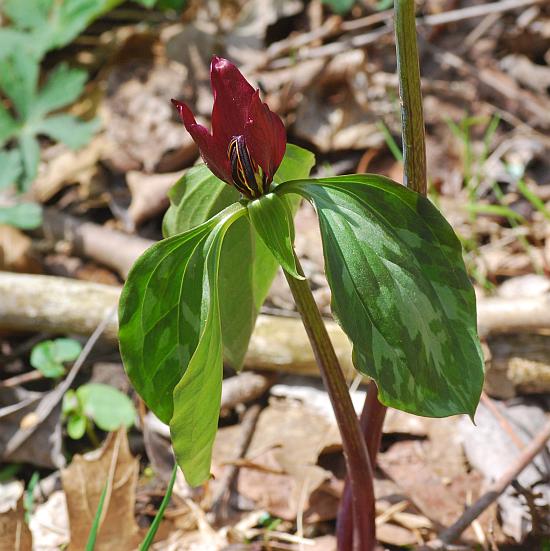Trillium recurvatum L.C. Beck
Purple Trillium

Native
CC = 6
CW = 3
MOC = 36
© SRTurner
Trillium recurvatum L.C. BeckPurple Trillium | |
 |
Native CC = 6 CW = 3 MOC = 36 |
© SRTurner |
|
Family - Liliaceae Habit - Perennial forb from short rhizomes. Stems - Ascending to erect, to 40 cm, simple, glabrous, greenish above, purplish near base.
Leaves - In a single whorl of 3 at the apex of the stem, simple, entire, with a short but distinct petiole to 1 cm long, glabrous. Blades 7-15 cm long, more than 2 times longer than wide, ovate or elliptic, the tips pointed, usually mottled above, light green below, the upper surface lacking stomates or with only a few near the tip.
Inflorescence - Single terminal, sessile, erect flower. Flowers - Sepals 3, reflexed from the base and pointing downward at flowering, 20-25 mm long, lanceolate to narrowly triangular, sometimes purplish tinged. Petals 3, 20-35 mm long, erect or arching inward, narrowed to a stalklike base 4-8 mm long, the expanded portion lanceolate to ovate, maroon, glabrous. Stamens 6, 8-17 mm long, less than half as long as the petals. Filaments maroon, 3 mm long, glabrous. Anthers dark purple, 7-8 mm long, falcate. Ovary superior, 3-sided but each side parted so appearing 6-angled, 4 mm long, glabrous, green, 3-locular. Styles 3, purple, slightly spreading, 3.5 mm long. Placentation axile.
Fruits - Ovoid berries to 2.5 cm, erect, with numerous seeds. Flowering - April - May. Habitat - Mesic and bottomland forests, lower slopes and bottoms of valleys and ravines, shaded, grassy roadsides, edges of old fields. Origin - Native to the U.S. Lookalikes - Other species of trillium, especially T. sessile. Other info. - This species of trillium is common in east-central Missouri, scattered in central and southern Missouri, and mostly absent elsewhere in the state. Beyond Missouri its range is largely restricted to the U.S. Midwest. It is easily recognized as a wake robin species of trillium by its sessile, erect flowers. It is easily differentiated from others in this group by its reflexed sepals, although several plants in a population should be examined, since the sepals can take a day or two to reflex from their upright orientation in bud. The leaves of well-developed specimens also have distinct petioles, unlike those of T. sessile. Overall, T. sessile is much more common in Missouri. Photographs taken at Rockwoods Reservation, St. Louis County, MO, 4-8-2010, Weldon Spring Conservation Area, St. Charles County, MO, 4-6-2011, Tyson County Park, St. Louis County, MO, 4-10-2011, Washington State Park, Washington County, MO, 4-21-2015, and Engelmann Woods Natural Area, Franklin County, MO, 4-12-2016 (SRTurner). |